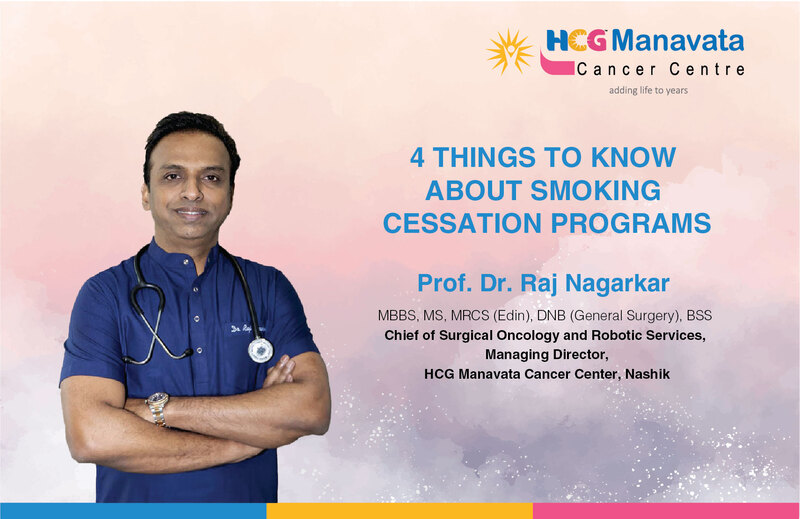Introduction
A smoking cessation program involves several customized strategies that assist smokers in quitting smoking and maintaining cessation. A smoking cessation program is an inexpensive, effective and simple intervention that has immediate and long-term health implications. A study reported that there is a smoking cessation rate of 22.5 % and a reduction in smoking in 25.8% of smokers through the smoking cessation program. Smoking not only results in lung cancer but also increases the risk of several other cancers, including oral cancer, throat cancer, esophageal cancer, bladder cancer, and colorectal cancer. When smokers contract cancer, they should receive the best oncology treatment in Nashik.
Things you should know about the smoking cessation program
- Self-help to quit smoking: Smokers are assisted at all levels to quit smoking by themselves without the need for treatment. One of the types is cold Turkey. In this, there is an abrupt cessation without any assistance. The majority of smokers quit through this method. They achieve this by planning a quit day or impulsively stopping in response to a trigger for smoking. Almost 3% of the smokers that quit smoking through this method are successful in quitting smoking. Cutting down on smoking is considered a preparatory step to quitting smoking. However, many smokers use it to reduce the frequency of smoking without quitting smoking. They believe that cutting down without quitting reduces the overall risk of negative health consequences. However, cutting down without the ultimate quitting does not reduce the risk of health effects. One of the side effects of this strategy is that the smokers smoke the remaining cigarettes more intensively to compensate for the reduced smoking. Self-help resources, including CDs, books, websites, and videos, assist smokers in quitting smoking.
- Strategies implemented in smoking cessation: Several strategies are implemented in the smoking cessation program. Some patients get easily motivated and may require a less intensive strategy for quitting smoking. However, others are unwilling to quit or have an increased tendency to relapse. The strategies may include behavioral interventions, pharmacotherapies, acupuncture, and hypnosis. The behavioral interventions include motivational interviewing, quitlines, social support, and face-to-face behavioral therapy. Motivational interviewing is based on the principles of supporting self-efficacy, developing discrepancy, expressing empathy, and rolling with resistance. Quitlines involve supporting smokers to quit smoking through the telephone. Social support involves the support of the smoking cessation specialist, family members, friends, and people who are on the path of quitting smoking. Face-to-face behavioral therapy is effective in smoking cessation, irrespective of the type of therapy or the provider. Pharmacotherapies include nicotine replacement therapy, combined therapy, nortriptyline, bupropion, varenicline, and clonidine.
- 5 As and 5 Rs: The brief smoking cessation strategies in clinical practices are indicated by 5As. The fives As are:
- Ask about smoking: During the smoking cessation program, the smoking status of the person is analyzed. The determination of the frequency of smoking helps in developing the strategy of quitting smoking in the smoking cessation program.
- Advise all smokers to stop: A strong, personalized, and clear message is given to all the smokers attending the program to quit smoking.
- Assess willingness to quit: It is also essential to determine the willingness of smokers to stop smoking. Smokers should be asked if they are ready to quit smoking immediately or anytime soon. Those who are motivated should be assisted in quitting smoking. The other who is unwilling to stop smoking should be motivated.
- Assist motivated smokers in quitting: The motivated smokers are assisted with plans, pharmacotherapy, counseling, and other strategies to quit smoking.
- Arrange follow-up: After the cessation program, a follow-up helps in assessing the success and difficulties. If the smoking relapses, there may be a need for a more intensive smoking cessation strategy.
The five Rs reinforce or generate the motivation to quit. These are:
Relevance: Under this strategy, the smoker is explained why smoking cessation is relevant to him.
Risks: The smoker is asked to determine the negative consequences of smoking.
Rewards: The smoker asked about the benefits of quitting smoking.
Roadblocks: Information is received from the smoker regarding the challenges and difficulties that are faced while quitting smoking.
Repetition: The five Rs should be applied to those smokers who are unmotivated and are not willing to quit smoking.
- Efficacy of a smoking cessation program: There are various advantages of the smoking cessation program. Quitting smoking through the smoking cessation program reduces the risk of several other diseases, including cancer, cardiovascular disease and pulmonary disorders, increased life expectancy, and poor reproductive health. If the smoking continues, the smoker may develop cancer and require the services of a top oncology treatment hospital. Further, quitting smoking also improves the quality of life and reduces the financial burden that includes both the cost of smoking and treatment. There is an improvement in the tissue blood flow and oxygen levels immediately after the cessation. Further, the platelet function normalizes within a week after cessation. It takes around four months to normalize the collagen synthesis and vitamin C levels. In terms of long-term positive effects of smoking cessation, smoking cessation lowers the risk of coronary artery disease by half of the smokers in one year. Also, the risk of stroke becomes similar to non-smokers within five years of quitting.

